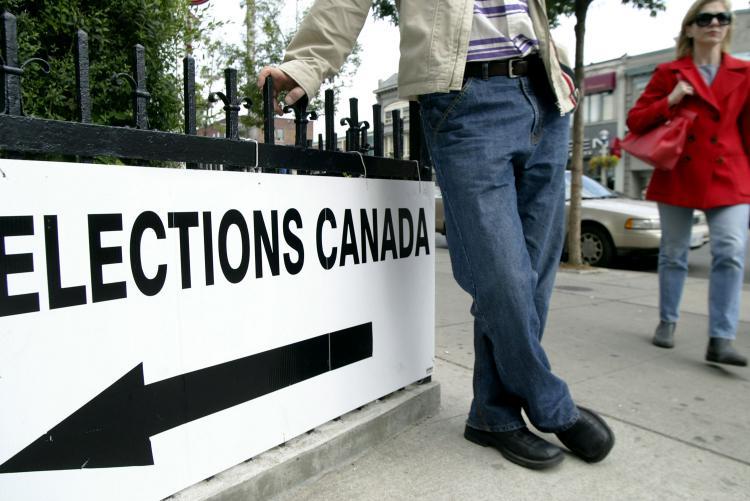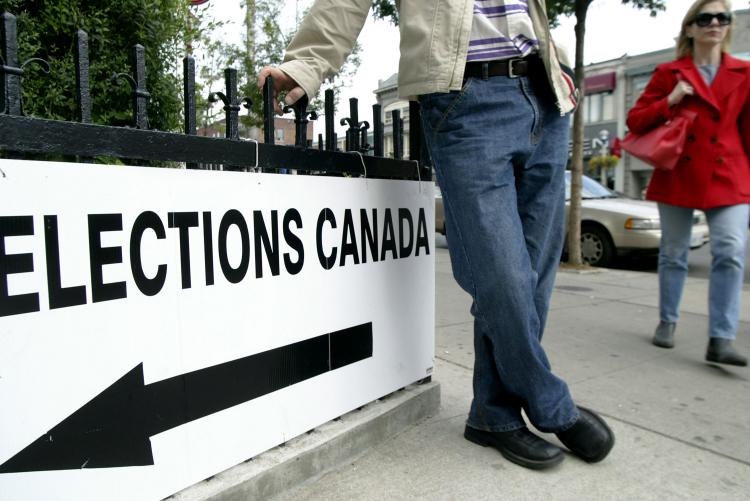Voter fatigue. Could it result in an even lower turnout at the next federal election which, given the goings on in Ottawa, could happen any day?
According to The Economics of Elections, a policy brief by the Canadian Chamber of Commerce, before another election gets underway politicians of all stripes need to think about how many Canadians will actually turn out to vote.
Voter turnout has been falling in Canada since 1988, reaching a historic low in the last election when only 58.8 percent of registered voters cast a ballot.
Unless this decline is reversed, the Canadian Chamber says the leaders that get elected and the policy positions they adopt will be determined by an ever smaller percentage of the population, thereby hurting the democratic process.
“Canada must make many vital decisions in the coming years, yet growing numbers of citizens feel that their votes don’t matter,” says Canadian Chamber president and CEO Perrin Beatty.
“If we are truly interested in the health of our democracy, all of our political parties have to do more to earn Canadians’ respect.”
As well as possible voter fatigue from three federal elections in the last five years, the report cites the usual suspects in low voter turnout: apathy, especially in young voters; lack of appealing candidates, parties, and/or issues; lack of confidence in the candidates and/or issues; and, in older voters, health concerns or being away from their riding on election day.
Rather than merely an election issue, Marc Chalifoux, executive vice president of the Historica Dominion Institute, believes that low voter turnout is linked to the state of a country’s democratic engagement.
“There’s a real democratic legitimacy that comes from being elected by a wide section of the population,” he says.
“We dipped below the 60 percent mark in voter turnout overall in the last election—that’s more than 40 percent of voters who stayed home. We’re probably not that far off from a democracy where there are more non-voters than voters, and then we start finding ourselves in very difficult democratic legitimacy questions about the health of our democracy.”
Voter turnout is especially low among young Canadians. Youth are not voting at the same rate as their elders or at the same rate as previous generations when they were the same age. This is problematic because studies show that if voters don’t start voting when they’re young, they tend to not vote in later years either.
“Voting is probably best understood as a habit, so the best predictor of whether someone will vote in an upcoming election is whether they voted in the last election,” Chalifoux says.
“In Canada less than four in 10 first-time voters voted in the last election. That’s a really astounding number. Especially when you think of voting as a habit it is a very worrying trend.”
Despite this being the information age, a survey by the Historica Dominion Institute found that 30 percent of those aged 18 to 25 said they didn’t vote in the 2008 election because they lacked information about candidates and issues.
“Young people are extremely connected to new media,” says Chalifoux, adding that it is in the interests of the political parties to court the youth vote, and the best way to do that is through such technologies as text messaging, Facebook, and Twitter.
“The Obama campaign really moved the ball forward in terms of using new media and new technologies to reach out to young voters. Canadian political parties, despite all their talk and their best efforts, really haven’t caught up to the same degree.”
He says the political party that make a systematic effort to communicate with young voters using new technologies “are really going to reap benefits at the ballot box.”
Other suggestions to increase voter participation include lowering the voting age to 16, online voting, mandatory voting, and moving to a proportional representation electoral system or a hybrid or mixed system.
More young people voting would help eliminate the emerging tendency of political parties to gear their policies to the interests of older Canadians, who have higher incidences of voting, pushing issues that interest youth—such as education—to the margins.
Groups such as Apathy is Boring, Student Vote, and Elections Canada all have various methods of trying to get youth engaged in the political process.
During the 2006 election, the Democracy Project, a Historica Dominion Institute initiative, reached over 66,000 young people through candidate debates, classroom activities, and a text messaging campaign. Since 2004, during each federal election the Democracy Project has run a free youth text initiative, enabling young people to voice their opinions and connect with political parties directly using SMS technology.
The Canadian Chamber of Commerce recommends that between elections, governments use multi-media campaigns to promote the importance of civic engagement.
Politicians could also participate in youth roundtables at high schools and universities, discussing relevant issues and exploring ways to increase political awareness through the Internet, the report said. Parents and the private sector can also play a role.
“The election period is far too short to persuade young Canadians that voting is a worthwhile endeavour,” Beatty says. “It’s a year-round job, and the stakes in the next federal election are even higher than in previous years.”
Voter turnout is declining in many western democracies. Brazil has had some success in attracting young voters since lowering the voting age to 16. Austria, Ecuador, and Nicaragua also allow 16-year-olds to vote. Australia keeps its voter turnout at a healthy 95 percent through mandatory voting.
Given the high percentage of American youth who voted for President Barack Obama in the last U.S. election, Chalifoux says getting more young Canadians to exercise their voting rights can be accomplished.
“It was really inspiring to see a whole new generation of voters come to the polls in such large numbers for the first time. So it’s not impossible, but we need to look at this problem seriously.”
According to The Economics of Elections, a policy brief by the Canadian Chamber of Commerce, before another election gets underway politicians of all stripes need to think about how many Canadians will actually turn out to vote.
Voter turnout has been falling in Canada since 1988, reaching a historic low in the last election when only 58.8 percent of registered voters cast a ballot.
Unless this decline is reversed, the Canadian Chamber says the leaders that get elected and the policy positions they adopt will be determined by an ever smaller percentage of the population, thereby hurting the democratic process.
“Canada must make many vital decisions in the coming years, yet growing numbers of citizens feel that their votes don’t matter,” says Canadian Chamber president and CEO Perrin Beatty.
“If we are truly interested in the health of our democracy, all of our political parties have to do more to earn Canadians’ respect.”
As well as possible voter fatigue from three federal elections in the last five years, the report cites the usual suspects in low voter turnout: apathy, especially in young voters; lack of appealing candidates, parties, and/or issues; lack of confidence in the candidates and/or issues; and, in older voters, health concerns or being away from their riding on election day.
Rather than merely an election issue, Marc Chalifoux, executive vice president of the Historica Dominion Institute, believes that low voter turnout is linked to the state of a country’s democratic engagement.
“There’s a real democratic legitimacy that comes from being elected by a wide section of the population,” he says.
“We dipped below the 60 percent mark in voter turnout overall in the last election—that’s more than 40 percent of voters who stayed home. We’re probably not that far off from a democracy where there are more non-voters than voters, and then we start finding ourselves in very difficult democratic legitimacy questions about the health of our democracy.”
Voter turnout is especially low among young Canadians. Youth are not voting at the same rate as their elders or at the same rate as previous generations when they were the same age. This is problematic because studies show that if voters don’t start voting when they’re young, they tend to not vote in later years either.
“Voting is probably best understood as a habit, so the best predictor of whether someone will vote in an upcoming election is whether they voted in the last election,” Chalifoux says.
“In Canada less than four in 10 first-time voters voted in the last election. That’s a really astounding number. Especially when you think of voting as a habit it is a very worrying trend.”
Despite this being the information age, a survey by the Historica Dominion Institute found that 30 percent of those aged 18 to 25 said they didn’t vote in the 2008 election because they lacked information about candidates and issues.
“Young people are extremely connected to new media,” says Chalifoux, adding that it is in the interests of the political parties to court the youth vote, and the best way to do that is through such technologies as text messaging, Facebook, and Twitter.
“The Obama campaign really moved the ball forward in terms of using new media and new technologies to reach out to young voters. Canadian political parties, despite all their talk and their best efforts, really haven’t caught up to the same degree.”
He says the political party that make a systematic effort to communicate with young voters using new technologies “are really going to reap benefits at the ballot box.”
Other suggestions to increase voter participation include lowering the voting age to 16, online voting, mandatory voting, and moving to a proportional representation electoral system or a hybrid or mixed system.
More young people voting would help eliminate the emerging tendency of political parties to gear their policies to the interests of older Canadians, who have higher incidences of voting, pushing issues that interest youth—such as education—to the margins.
Groups such as Apathy is Boring, Student Vote, and Elections Canada all have various methods of trying to get youth engaged in the political process.
During the 2006 election, the Democracy Project, a Historica Dominion Institute initiative, reached over 66,000 young people through candidate debates, classroom activities, and a text messaging campaign. Since 2004, during each federal election the Democracy Project has run a free youth text initiative, enabling young people to voice their opinions and connect with political parties directly using SMS technology.
The Canadian Chamber of Commerce recommends that between elections, governments use multi-media campaigns to promote the importance of civic engagement.
Politicians could also participate in youth roundtables at high schools and universities, discussing relevant issues and exploring ways to increase political awareness through the Internet, the report said. Parents and the private sector can also play a role.
“The election period is far too short to persuade young Canadians that voting is a worthwhile endeavour,” Beatty says. “It’s a year-round job, and the stakes in the next federal election are even higher than in previous years.”
Voter turnout is declining in many western democracies. Brazil has had some success in attracting young voters since lowering the voting age to 16. Austria, Ecuador, and Nicaragua also allow 16-year-olds to vote. Australia keeps its voter turnout at a healthy 95 percent through mandatory voting.
Given the high percentage of American youth who voted for President Barack Obama in the last U.S. election, Chalifoux says getting more young Canadians to exercise their voting rights can be accomplished.
“It was really inspiring to see a whole new generation of voters come to the polls in such large numbers for the first time. So it’s not impossible, but we need to look at this problem seriously.”






